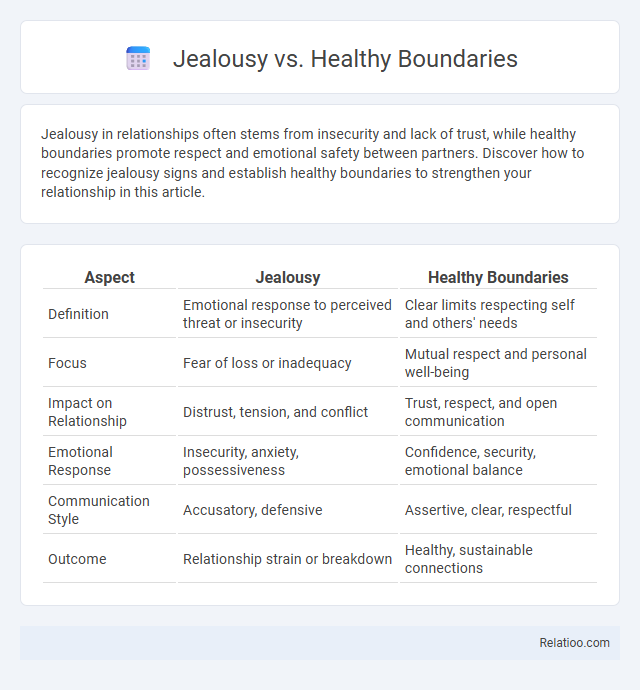Jealousy in relationships often stems from insecurity and lack of trust, while healthy boundaries promote respect and emotional safety between partners. Discover how to recognize jealousy signs and establish healthy boundaries to strengthen your relationship in this article.
Table of Comparison
| Aspect | Jealousy | Healthy Boundaries |
|---|---|---|
| Definition | Emotional response to perceived threat or insecurity | Clear limits respecting self and others' needs |
| Focus | Fear of loss or inadequacy | Mutual respect and personal well-being |
| Impact on Relationship | Distrust, tension, and conflict | Trust, respect, and open communication |
| Emotional Response | Insecurity, anxiety, possessiveness | Confidence, security, emotional balance |
| Communication Style | Accusatory, defensive | Assertive, clear, respectful |
| Outcome | Relationship strain or breakdown | Healthy, sustainable connections |
Understanding Jealousy in Relationships
Jealousy in relationships often stems from insecurity and fear of losing Your partner, but recognizing its root causes helps distinguish it from healthy boundaries and toxicity. Healthy boundaries involve mutual respect and clear communication that protect emotional wellbeing without provoking control or mistrust. Toxicity arises when jealousy escalates into possessiveness, manipulation, or emotional abuse, eroding trust and intimacy.
Defining Healthy Boundaries
Healthy boundaries are clear limits that protect your emotional well-being and ensure respectful interactions in relationships. They allow for mutual trust and personal autonomy without controlling or envious behaviors. Recognizing the difference between jealousy, which can signal insecurity, and toxicity, which involves harmful manipulation, is key to maintaining balanced and positive connections.
Common Triggers of Jealousy
Common triggers of jealousy include perceived threats to self-esteem, fear of abandonment, and insecurity within relationships. Situations such as partner's close interactions with others, lack of communication, or previous experiences of betrayal often amplify these feelings. Understanding these triggers is crucial for distinguishing between jealousy, healthy boundaries, and toxicity in interpersonal dynamics.
Signs of Unhealthy Jealousy
Unhealthy jealousy often manifests through persistent suspicion, controlling behavior, and an inability to trust your partner, which can erode relationship stability. Signs of this toxicity include constant monitoring, unreasonable accusations, and emotional manipulation that restrict personal freedom. Recognizing these behaviors early is crucial to maintaining healthy boundaries and fostering mutual respect in your relationship.
Benefits of Setting Healthy Boundaries
Setting healthy boundaries enhances your emotional well-being by creating clear limits that prevent jealousy from escalating into toxicity. Establishing these limits promotes mutual respect and trust in relationships, reducing misunderstandings and conflicts. By prioritizing your needs, you foster a balanced connection that supports personal growth and long-term relationship stability.
Jealousy vs. Protective Instincts: Key Differences
Jealousy stems from insecurity and fear of losing someone, often leading to possessive or controlling behaviors, whereas protective instincts are driven by genuine care and concern for a loved one's well-being and safety. Jealousy can trigger emotional distress and damage relationships, while healthy protective boundaries maintain trust and respect without infringing on personal freedom. Understanding these distinctions helps individuals recognize when feelings are rooted in unhealthy jealousy versus natural protective instincts.
How to Communicate Boundaries Effectively
Communicating boundaries effectively requires clear, assertive language that conveys specific limits without aggression, ensuring mutual respect in relationships. Using "I" statements helps express personal needs and feelings, reducing misunderstandings and minimizing defensive reactions. Consistent reinforcement of these boundaries and openness to dialogue fosters trust while preventing jealousy and toxicity from undermining emotional well-being.
Managing Insecurity and Building Trust
Managing insecurity involves recognizing jealousy as a natural emotion and distinguishing it from toxic behaviors that harm relationships. Establishing healthy boundaries fosters open communication and mutual respect, which strengthens trust between partners. Your ability to set clear limits and address insecurities constructively is essential for nurturing a secure and supportive connection.
Strategies for Overcoming Jealousy
Overcoming jealousy requires recognizing your emotions and setting healthy boundaries that protect your mental well-being without isolating others. You can practice open communication, self-reflection, and build trust by addressing insecurities rather than controlling behavior. Establishing limits that respect both your needs and others' autonomy reduces toxicity and fosters healthier relationships.
Fostering Respectful and Balanced Relationships
Jealousy often signals underlying insecurities that can strain relationships, whereas healthy boundaries establish clear limits promoting trust and mutual respect. Toxicity arises when jealousy turns controlling or manipulative, eroding communication and emotional safety. Fostering respectful and balanced relationships requires recognizing jealousy as a cue for honest dialogue, reinforcing boundaries, and rejecting behaviors that undermine well-being.

Infographic: Jealousy vs Healthy Boundaries
 relatioo.com
relatioo.com